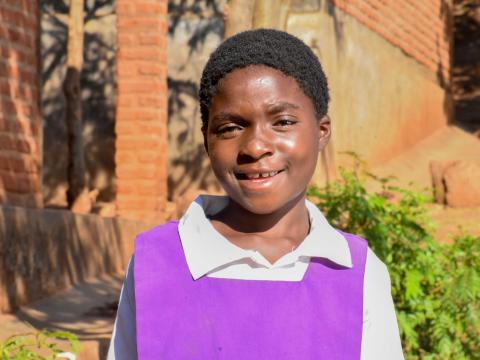Thriving with visual impairment.

Emily is an eleven year old girl at Bulaya village, Traditional Authority Mazengera in Chilenje community in Lilongwe.
The last born of five children is in grade five now, but she now has developed some visual challenges making her slowly developing a short sight.
Emily recalls one morning she woke up with swollen eyes. Her parents deemed her condition temporary, but regretted when after days the situation did not improve.
Attempts to seek medication with health institutions have not yet improved the aspiring doctor’s condition.
Currently, she still goes to school albeit struggling to establish a clear vision of things in class.
“Despite my sight problem, I still go to school because I want to fulfil my dream to become a medical doctor to help people in my community,” she says.

Emily has visited some eye sight clinics but has not yet gotten the requisite treatment because her condition requires some monetary resources.
“Since the problem started, my parents took me to some eye clinics including the referral hospital, Kamuzu Central Hospital, but I have not received the requisite treatment yet because we need some money and currently my parents cannot afford, “she says.
Emily feels if Government could put well trained eye specialists in its public hospitals then may be her condition could not have worsened.
“I feel like my condition has gotten worse because government health facilities in the communities do not have eye specialists. Most of them are found in referral hospitals, far from our communities. So my plea is government must deploy eye specialists to rural hospitals if they want to deal with a predicament like mine,” she says.
The aspiring medical doctor also implores World Vision to provide the necessary aids to children with visual impairment to achieve equity with access to education as enshrined in the Sustainable Development Goal (SDG) number 4.
“But also World Vision could help us by providing visual aids to children like me so that despite having the eye problem at least at school I can concentrate like all other learners.”
Palikena Laika is deputy head teacher at Emily’s school. Laika says her school has a number of visually impaired learners like Emily.
Laika, she says, to help children of Emily’s condition, they print examination papers in larger fonts so that leaners like Emily are able to see.
“Noting visual challenges like Emily’s, we made deliberate plans to print our exams in lager fonts so that leaners like Emily are able to see and attempt the exams just like everyone else,” says Laika.
World Vision Malawi has recently launched Able to Thrive, a new disability inclusion project that is planning to reach up to ten thousand children with various disabilities by 2027 and 4300 in the next three years.

“Our commitment in this projects is to enhance programming practices and implement strategies ensuring full, equal, and meaningful participation for children and adults with disabilities, explains Francis Dube, World Vision Malawi National Director.